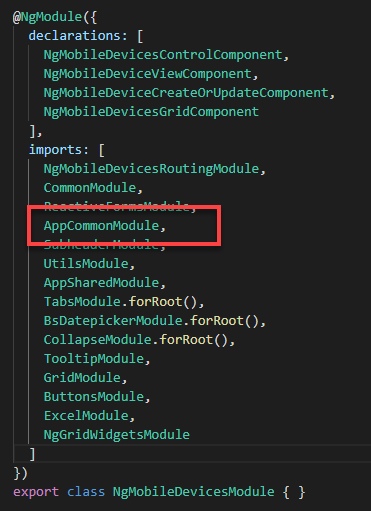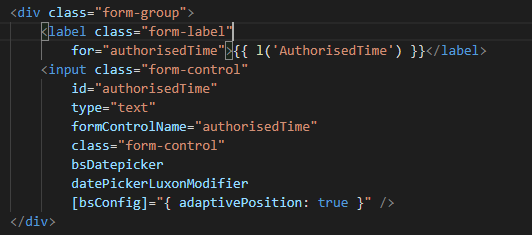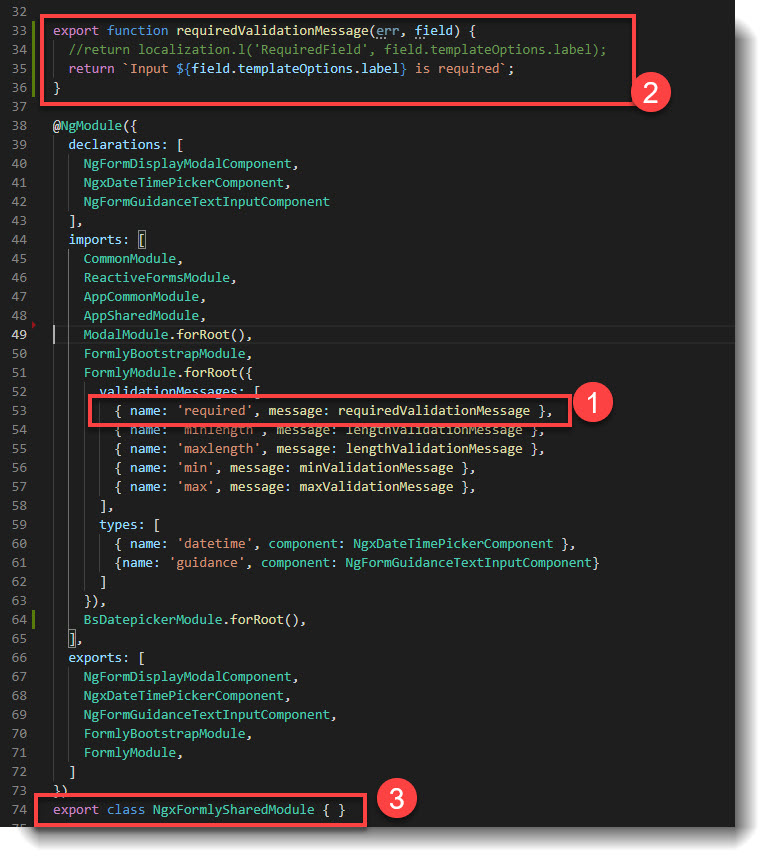Activities of "BobIngham"
Thanks, I'll close this for now.
Hi @ismcagdas,
This post taken from the other issue raised by @najeebalmajeedy (Use datetimePicker in angular)
I have the following code in my own module which imports the AppCommon module;

The AppCommon module has the the date picker module declared as a provider:

Yet, when I attempt to use the date picker in my reactive form using the following code:

The first thing I notice is that the date picker displays using US format once a date is selected The subject of my previous post, see above).
I can save this date to the database correctly but when I next come to edit I have an "invalid date" message displayed in the input field:
The component works perfectly when I use the the demo-ui component. What am I missing?
Hi @ismcagdas,
Those three lines worked for initial formatting when selected from the datepicker:
 However, when I go to edit the same I am getting "invalid date":
However, when I go to edit the same I am getting "invalid date":

I have noticed that in edit-tenant-modal.ts that the subscription date is formatted at line 72:
onShown(): void {
document.getElementById('Name').focus();
if (this.tenant.subscriptionEndDateUtc) {
(this.subscriptionEndDateUtc.nativeElement as any).value = this._dateTimeService.formatDate(
this.tenant.subscriptionEndDateUtc,
'F'
);
}
}
Is it the case that I need to format every date passed into my create-or-edit component before I display? I thought this was carried automatically by service proxies os some such other service?
.net core, angular, 11.0.0
I am using Formly in my application and to support error validation messages in bootstrap the recommendation is to implement the following in my module class:
imports: [
... code removed for brevity
FormlyBootstrapModule,
FormlyModule.forRoot({
validationMessages: [
{ name: 'required', message: requiredValidationMessage },
{ name: 'minlength', message: lengthValidationMessage },
{ name: 'maxlength', message: lengthValidationMessage },
{ name: 'min', message: minValidationMessage },
{ name: 'max', message: maxValidationMessage },
],
}),
We then have the following (example) function above the @NgModule declaration:
export function requiredValidationMessage(err, field) {
return `Input ${field.templateOptions.label} is required`;
}
See Formly - built in validations for suggested implementation.
What I would like to achieve is to use pre-existing validation messages from the language xml file but I can find no way to access the language service in my module. Ideally something like this....
export function requiredValidationMessage(err, field) {
return this.l('RequiredField', field.templateOptions.label);
}
Is there any way to access the language service from within a module class or is there a different way to implement this? Thanks in advance....
Hi @ismacagdas,
Thanks for the reply.
My problem seems to be with the recommended implementation from Formly, as shown in the image below.

- The validation message is invoked within the @NgModule decorator but;
- the function is outside of the module itself (3.)
I could use abp.localization.localize javascript function to localize text but I have no idea how I would inject the variable to get "Input {input-label} is required". Can you shine any light on this? Any help would be most appreciated.
Perfect, @ismcagdas. Thanks as always!
Hi omkarchoudhari,
I had a similar problem with hundreds of devices using Ionic 5 (cross platform). Try catching the errors in the app code and log them to Sentry. I was using a third party to code the Ionic app and I was able to monitor progress throughout development by analysing errors. A further option is to pull commonly used API call code into a Helper class in the Core module and implement a seperate AppService class for device API calls. You are then easily able to filter any device call errors in the Audit Logs.
Hope that helps. Bob
.Net Core, Angular, 11.0.0
Am I missing something here, I was certain EF lazy loading was disabled in Zero. I have a simple call to a table in my application layer:
var listTest = _ngFormSubmissionRepository.GetAll().ToList();
My FormSubmission table has millions of rows and a few parent tables, enabled in code as follows:
public class NgFormSubmission : FullAuditedEntity<long>, IMustHaveTenant
{
public int TenantId { get; set; }
public long? OrganizationUnitId { get; set; }
[Required]
public long UserId { get; set; }
[ForeignKey("NgFormId")]
public virtual NgForm NgForm { get; set; }
public virtual int? NgFormId { get; set; }
[ForeignKey("NgEntityId")]
public virtual NgEntity NgEntity { get; set; }
public System.Guid? NgEntityId { get; set; }
[ForeignKey("NgMobileDeviceId")]
public virtual NgMobileDevice NgMobileDevice { get; set; }
public int? NgMobileDeviceId { get; set; }
[ForeignKey("NgActionId")]
public virtual NgAction NgAction { get; set; }
public long? NgActionId { get; set; }
... code removed for brevity
I make a single call to get a list of FormSubmissions:
var listTest = _ngFormSubmissionRepository.GetAll().ToList();
and the SQL created as a result includes calls to parent entities (NgForm, NgEntity, NgMobileDevice and so on) which is not so bad but also included are calls to children of those entities.
SELECT [t].[ClientCreatedDatetime], [t].[CreationTime], COALESCE([t].[CreatorUserId], CAST(0 AS bigint)), [t].[DeleterUserId], [t].[DeletionTime], [t].[Id], [t].[IsDeleted], [t].[IsFlagged], [t].[LastModificationTime], [t].[LastModifierUserId], CASE
WHEN [t0].[Id] IS NULL THEN CAST(1 AS bit)
ELSE CAST(0 AS bit)
END, [t0].[CreationTime], COALESCE([t0].[CreatorUserId], CAST(0 AS bigint)), [t0].[DeleterUserId], [t0].[DeletionTime], [t0].[DisplayName], [t0].[ExtensionData], [t0].[Id], [t0].[IsDeleted], [t0].[LastModificationTime], [t0].[LastModifierUserId], CASE
WHEN [t1].[Id] IS NULL THEN CAST(1 AS bit)
ELSE CAST(0 AS bit)
END, [t1].[CreationTime], COALESCE([t1].[CreatorUserId], CAST(0 AS bigint)), [t1].[DeleterUserId], [t1].[DeletionTime], [t1].[Description], [t1].[DisplayName], [t1].[ExtensionData], [t1].[FormReportTemplate], [t1].[Id], [t1].[IsDeleted], [t1].[IsEditable], [t1].[LastModificationTime], [t1].[LastModifierUserId], [t1].[SerializedJson], [t1].[TenantId], [t0].[NgFormId], [t0].[OrganizationUnitId], [t0].[ParentId], [t0].[TenantId], [t].[NgActionId], CASE
WHEN [t2].[Id] IS NULL THEN CAST(1 AS bit)
ELSE CAST(0 AS bit)
END, [t2].[CreationTime], COALESCE([t2].[CreatorUserId], CAST(0 AS bigint)), [t2].[DeleterUserId], [t2].[DeletionTime], [t2].[DisplayName], [t2].[ExtensionData], [t2].[Id], [t2].[IsDeleted], [t2].[LastModificationTime], [t2].[LastModifierUserId], [t2].[TenantId], [t].[NgEntityId], CASE
WHEN [t3].[Id] IS NULL THEN CAST(1 AS bit)
ELSE CAST(0 AS bit)
END, [t3].[CreationTime], COALESCE([t3].[CreatorUserId], CAST(0 AS bigint)), [t3].[DeleterUserId], [t3].[DeletionTime], [t3].[Description], [t3].[DisplayName], [t3].[ExtensionData], [t3].[FormReportTemplate], [t3].[Id], [t3].[IsDeleted], [t3].[IsEditable], [t3].[LastModificationTime], [t3].[LastModifierUserId], [t3].[SerializedJson], [t3].[TenantId], [t].[NgFormId], CASE
WHEN [t4].[Id] IS NULL THEN CAST(1 AS bit)
ELSE CAST(0 AS bit)
END, [t4].[AppVersion], [t4].[AuthorisedTime], [t4].[Cordova], [t4].[CreationTime], COALESCE([t4].[CreatorUserId], CAST(0 AS bigint)), [t4].[DeleterUserId], [t4].[DeletionTime], [t4].[ExtensionData], [t4].[Id], [t4].[IMEI], [t4].[IsAuthorised], [t4].[IsDeleted], [t4].[IsOnline], [t4].[IsVirtual], [t4].[LastModificationTime], [t4].[LastModifierUserId], [t4].[Manufacturer], [t4].[Model], [t5].[Id], [t5].[LoginDatetime], [t5].[LogoutDatetime], [t5].[NgMobileDeviceId], [t5].[TenantId], [t5].[UserId], [t6].[CreationTime], [t6].[CreatorUserId], [t6].[DeleterUserId], [t6].[DeletionTime], [t6].[Directive], [t6].[ExtensionData], [t6].[Id], [t6].[IsDeleted], [t6].[NgMobileDeviceId], [t6].[Priority], [t6].[TenantId], [t4].[Platform], [t4].[Serial], [t4].[TenantId], [t4].[UUID], [t4].[Version], [t].[NgMobileDeviceId], [t].[OrganizationUnitId], [t].[ReportString], [t].[SerializedJson], [t].[TenantId], [t].[UserId]
FROM (
SELECT [n].[Id], [n].[ClientCreatedDatetime], [n].[CreationTime], [n].[CreatorUserId], [n].[DeleterUserId], [n].[DeletionTime], [n].[IsDeleted], [n].[IsFlagged], [n].[LastModificationTime], [n].[LastModifierUserId], [n].[NgActionId], [n].[NgEntityId], [n].[NgFormId], [n].[NgMobileDeviceId], [n].[OrganizationUnitId], [n].[ReportString], [n].[SerializedJson], [n].[TenantId], [n].[UserId]
FROM [NgFormSubmission] AS [n]
WHERE ((((@__ef_filter__p_0 = CAST(1 AS bit)) OR ([n].[IsDeleted] = CAST(0 AS bit))) AND ((@__ef_filter__p_1 = CAST(1 AS bit)) OR ([n].[TenantId] = @__ef_filter__CurrentTenantId_2))) AND ([n].[IsDeleted] = @__isDeleted_0)) AND ([n].[NgEntityId] = @__p_1)
ORDER BY [n].[ClientCreatedDatetime] DESC
OFFSET @__p_2 ROWS FETCH NEXT @__p_3 ROWS ONLY
) AS [t]
LEFT JOIN (
SELECT [n0].[Id], [n0].[CreationTime], [n0].[CreatorUserId], [n0].[DeleterUserId], [n0].[DeletionTime], [n0].[DisplayName], [n0].[ExtensionData], [n0].[IsDeleted], [n0].[LastModificationTime], [n0].[LastModifierUserId], [n0].[NgFormId], [n0].[OrganizationUnitId], [n0].[ParentId], [n0].[TenantId]
FROM [NgAction] AS [n0]
WHERE ((@__ef_filter__p_3 = CAST(1 AS bit)) OR ([n0].[IsDeleted] = CAST(0 AS bit))) AND ((@__ef_filter__p_4 = CAST(1 AS bit)) OR ([n0].[TenantId] = @__ef_filter__CurrentTenantId_5))
) AS [t0] ON [t].[NgActionId] = [t0].[Id]
LEFT JOIN (
SELECT [n1].[Id], [n1].[CreationTime], [n1].[CreatorUserId], [n1].[DeleterUserId], [n1].[DeletionTime], [n1].[Description], [n1].[DisplayName], [n1].[ExtensionData], [n1].[FormReportTemplate], [n1].[IsDeleted], [n1].[IsEditable], [n1].[LastModificationTime], [n1].[LastModifierUserId], [n1].[SerializedJson], [n1].[TenantId]
FROM [NgForm] AS [n1]
WHERE ((@__ef_filter__p_6 = CAST(1 AS bit)) OR ([n1].[IsDeleted] = CAST(0 AS bit))) AND ((@__ef_filter__p_7 = CAST(1 AS bit)) OR ([n1].[TenantId] = @__ef_filter__CurrentTenantId_8))
) AS [t1] ON [t0].[NgFormId] = [t1].[Id]
LEFT JOIN (
SELECT [n2].[Id], [n2].[CreationTime], [n2].[CreatorUserId], [n2].[DeleterUserId], [n2].[DeletionTime], [n2].[DisplayName], [n2].[ExtensionData], [n2].[IsDeleted], [n2].[LastModificationTime], [n2].[LastModifierUserId], [n2].[TenantId]
FROM [NgEntity] AS [n2]
WHERE ((@__ef_filter__p_9 = CAST(1 AS bit)) OR ([n2].[IsDeleted] = CAST(0 AS bit))) AND ((@__ef_filter__p_10 = CAST(1 AS bit)) OR ([n2].[TenantId] = @__ef_filter__CurrentTenantId_11))
) AS [t2] ON [t].[NgEntityId] = [t2].[Id]
LEFT JOIN (
SELECT [n3].[Id], [n3].[CreationTime], [n3].[CreatorUserId], [n3].[DeleterUserId], [n3].[DeletionTime], [n3].[Description], [n3].[DisplayName], [n3].[ExtensionData], [n3].[FormReportTemplate], [n3].[IsDeleted], [n3].[IsEditable], [n3].[LastModificationTime], [n3].[LastModifierUserId], [n3].[SerializedJson], [n3].[TenantId]
FROM [NgForm] AS [n3]
WHERE ((@__ef_filter__p_6 = CAST(1 AS bit)) OR ([n3].[IsDeleted] = CAST(0 AS bit))) AND ((@__ef_filter__p_7 = CAST(1 AS bit)) OR ([n3].[TenantId] = @__ef_filter__CurrentTenantId_8))
) AS [t3] ON [t].[NgFormId] = [t3].[Id]
LEFT JOIN (
SELECT [n4].[Id], [n4].[AppVersion], [n4].[AuthorisedTime], [n4].[Cordova], [n4].[CreationTime], [n4].[CreatorUserId], [n4].[DeleterUserId], [n4].[DeletionTime], [n4].[ExtensionData], [n4].[IMEI], [n4].[IsAuthorised], [n4].[IsDeleted], [n4].[IsOnline], [n4].[IsVirtual], [n4].[LastModificationTime], [n4].[LastModifierUserId], [n4].[Manufacturer], [n4].[Model], [n4].[Platform], [n4].[Serial], [n4].[TenantId], [n4].[UUID], [n4].[Version]
FROM [NgMobileDevice] AS [n4]
WHERE ((@__ef_filter__p_12 = CAST(1 AS bit)) OR ([n4].[IsDeleted] = CAST(0 AS bit))) AND ((@__ef_filter__p_13 = CAST(1 AS bit)) OR ([n4].[TenantId] = @__ef_filter__CurrentTenantId_14))
) AS [t4] ON [t].[NgMobileDeviceId] = [t4].[Id]
NOTE THESE LEFT JOINS.....
LEFT JOIN (
SELECT [n5].[Id], [n5].[LoginDatetime], [n5].[LogoutDatetime], [n5].[NgMobileDeviceId], [n5].[TenantId], [n5].[UserId]
FROM [NgMobileDeviceAndUserLoginAudit] AS [n5]
WHERE (@__ef_filter__p_15 = CAST(1 AS bit)) OR ([n5].[TenantId] = @__ef_filter__CurrentTenantId_16)
) AS [t5] ON [t4].[Id] = [t5].[NgMobileDeviceId]
LEFT JOIN (
SELECT [n6].[CreationTime], [n6].[CreatorUserId], [n6].[DeleterUserId], [n6].[DeletionTime], [n6].[Directive], [n6].[ExtensionData], [n6].[Id], [n6].[IsDeleted], [n6].[NgMobileDeviceId], [n6].[Priority], [n6].[TenantId]
FROM [NgMobileDeviceOfflineDirective] AS [n6]
WHERE ((@__ef_filter__p_17 = CAST(1 AS bit)) OR ([n6].[IsDeleted] = CAST(0 AS bit))) AND ((@__ef_filter__p_18 = CAST(1 AS bit)) OR ([n6].[TenantId] = @__ef_filter__CurrentTenantId_19))
) AS [t6] ON [t4].[Id] = [t6].[NgMobileDeviceId]**
ORDER BY [t].[ClientCreatedDatetime] DESC, [t].[Id], [t0].[Id], [t1].[Id], [t2].[Id], [t3].[Id], [t4].[Id], [t5].[Id]
My NgMobileDevice entity has audit tables for geolocation tracking and user sign-in/sign-out, each of which has several million rows making the query very ugly indeed. I thought Zero worked the lines of:
var listTest = _ngFormSubmissionRepository.GetAll()
.Include(m => m.NgMobileDevice)
.ToList();
when you wanted to include parents and children? Am I missing something and is there any way I can switch off EF lazy loading? More for my understanding of the application, maybe I've beign doing things incorrectly all these years?????
Cheers, Bob
Hi @ismcagdas, It's not a custom repository, it's simply declared as a Zero repository at the top of my app service. How do I switch off lazy loading in Zero?